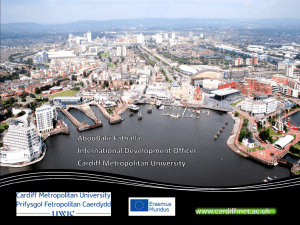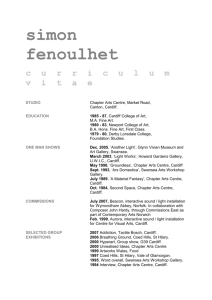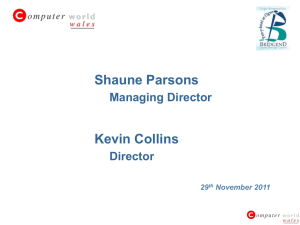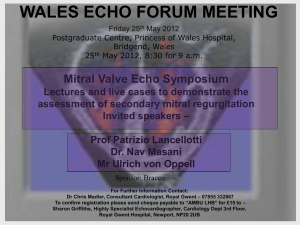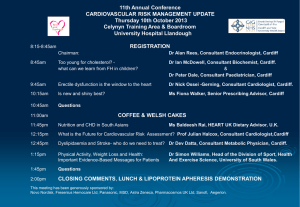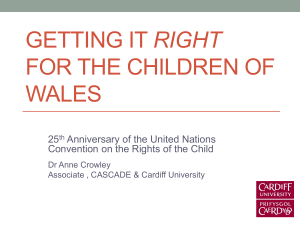Our Selection Process - School of Medicine
advertisement
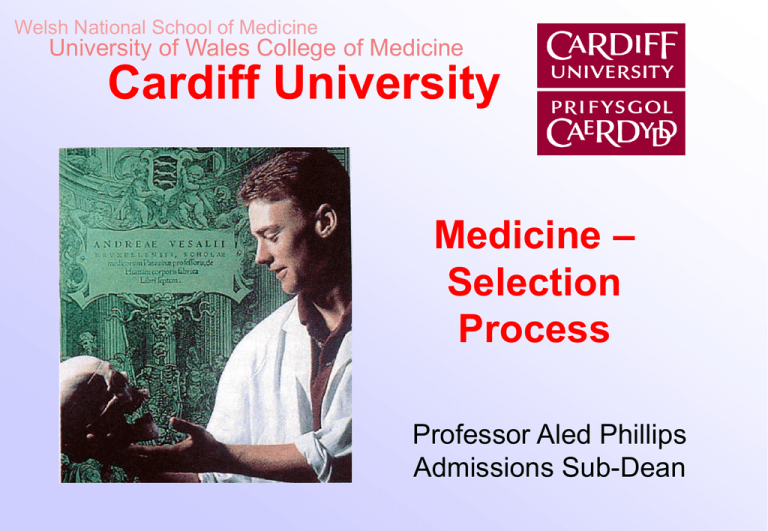
Welsh National School of Medicine University of Wales College of Medicine Cardiff University Medicine – Selection Process Professor Aled Phillips Admissions Sub-Dean Your selection: The course The facilities The location Support for students Entry requirements Which Medical School ? 30 undergraduate medical schools 1 5 1 23 - Wales Scotland N. Ireland England (including 5 in London) 2 postgraduate medical schools Swansea and Warwick Are all courses the same ? Yes and No!! Yes -General Medical Council Knowledge Skills Attitudes Behaviour Are all courses the same? No - Course structure Course Structures: Traditional - preclinical & clinical Integrated/system based – multidisciplinary Methods of teaching: PBL - problem-based learning Lectures, practicals, tutorials Hybrid C21: what are the principles? Principles Evidence based Early clinical experience Small group learning Case based learning – facilitated small group learning based on clinical scenarios Reliable and fair assessments developing tomorrow’s C21 doctors The traditional divide Qualification Clinical science Year 5 Year 4 Year 3 Year 2 Year 1 Entry Slide Courtesy Prof Paul Bradley Basic science 7 Vertical integration Life long learners Clinical science Clinical Practice Evidence based Year 5 Year 4 Scientifically informed Research minded Research capable Year 3 Year 2 Year 1 Selection and admission Slide Courtesy Prof Paul Bradley Basic science 8 C21: Changing the MBBCh course Scholarship Science Phase 1 Phase 2 Phase 3 Years 1&2 Years 3&4 Years 5 & F1 Core science and clinical practice Learning to Care Learning from and at work Integrated contemporary clinical / science experience Consolidated preparation for practice and work-based learning Safety Service Clinical immersion Simultaneous science Case based learning • The case is the key to the learning • Clinical scenario introduces the subject area • Support for students – – – – Seminars Practical experiences Patient encounters Clinical skills C21: Phase 1 learning Seminars Life sciences Assessment Practicals Structured small group session: e-Learning Placements Plenaries ‘case scenarios’ Clinical skills Learning outcomes Self directed learning Ischaemic Heart Disease Spiral Curriculum : Ischaemic Heart Disease Year 5 – Clinical Assistantships/Primary Care Direct patient management Year 4 – Chronic Disease Management Implications for patient and service delivery Year 3 – Hospital Front Door Different patient presentations Treatment options Year 2 – Older person 2 Pathophysiology and Co-morbidity Year 1 – PCS and Dedicated Case Introduction to Basic and Clinical science Year 5 Year 4 Year 3 Year 2 Year 1 C21: Harmonisation what does it mean for you? Work-place based education around Wales Predominantly clinical experience enhanced with supplementary simulation Increasing responsibility in an assistantship model Facilities Heath Park Campus Shared site • University Hospital of Wales • Children’s Hospital for Wales • New Teaching Accommodation opened 2008 • IV Lounge for Students completed 2009 (social club) • Very Very New Cochrane Building Heath Park Campus Research: • Institute of Medical Genetics • Centre for Neuropsychiatric Genetics and Genomics • Wales Heart Research Institute • Henry Wellcome Centre for Biomedical Research • Cancer Research UK Centre • Arthritis Research Campaign Biomechanics & Bioengineering Centre Other major hospitals in Cardiff: University Hospital Llandough Velindre Whitchurch Other hospitals in South East Wales: Royal Gwent – Newport Royal Glamorgan – Llantrisant Princess of Wales – Bridgend Prince Charles – Merthyr Tydfil University University Hospital DGH GPs Location: Cardiff • Capital of Wales • Population 350,000 • Close to sea and mountains • Multicultural community • Good transport links • Safe, friendly, affordable Cardiff • Major developments: Millennium Stadium, Millennium Centre International Arena, International Sports Village New Shopping Centre • Within a 1 mile radius: City Centre – shops, entertainment, etc Main University campus, University Hospital site Most student accommodation Cardiff University • 26,000 students, 6000 staff • Multidisciplinary • Member of the Russell Group • 125 years old Main Campus - base for initial stages Heath Park Campus – clinical training Accommodation • Guaranteed single occupancy room for everyone who accepts our offer of a place • 5300 study bedrooms • Catered or self catered • 70% En suite • Internet connection Personal Support / Pastoral Care • Student Support services – – – – Study Skills Counselling Disability / Dyslexia Support Unit Financial Advice – Hardship and Access funds – Careers Service – Accommodation – Health Service • Student Union – Welfare and legal advice Personal Support / Pastoral Care • Personal Tutors • Pastoral Care on Placement • Buddy Schemes • Year Co-ordinators • Deanery • FY1 Liaison Cardiff’s Selection Policy • • • • • • • Open Equitable Non-discriminatory Reliable, valid and relevant Defined criteria Consistent with legislation Approved by Board of Medical Studies http://medicine.cf.ac.uk/en/degree-programmes/undergraduate/admissions medicaladmissions@cf.ac.uk What is Medicine? “The art or science of prevention and cure of disease” What Sorts of Medicine are there? • Primary Care (General Practice) • Secondary Care • • • • • • • • • • • Accident & Emergency Anaesthetics & Intensive Care Clinical Pharmacology & Toxicology Medicine Mental Illness Obstetrics & Gynaecology Paediatrics Pathology Radiology Rehabilitation Surgery What Sorts of Medicine are there? • Medicine • • • • • • • • • • • • • • • • General Medicine Cardiology Dermatology Endocrinology Gastroenterology Genitourinary Medicine Geriatric Medicine Infectious Diseases Medical Genetics Nephrology Neurology Nuclear Medicine Oncology Palliative Medicine Rheumatology Thoracic Medicine What Sorts of Medicine are there? • • • • • • • • • • • • Primary Care Secondary Care Community Medicine Academic Medicine Private Practice Pharmaceutical Industry Armed Forces Aviation Medicine Travel Industry Aid Organisations Legal Medicine Overseas No “stereotype”, No “typical” student Routes into Medicine in Cardiff Applying with your GCSE Two courses A100 and A104 to accommodate all subject choices Applying with your A levels So its not all about your GCSEs!! Applying with a Degree There is hope even after A level!! “Feeder Courses” Selection Process for ALL Routes: Three scored stages: academic - non-academic - interview Documented extenuating circumstances are taken into account if presented at the time of application Non-Academic Criteria Personal Statement Insight into the Medical career A caring attitude towards people and social awareness Team-working and a willingness to accept responsibility Study skills- evidence of self directed learning Evidence of balanced approach to life [Referee’s comments] Scored by trained selectors Work Experience: Why? To show that the applicant understands medicine as a career To enable the applicant to demonstrate that they have had people focused experience of providing care to other people and that they understand the realities of working in a caring profession. To enable the applicant to demonstrate some of the attitudes and behaviours essential to being a doctor such as conscientiousness, good communication skills or the ability to interact with a wide variety of people. Work Experience – bottom line Remember: it is what you learnt not what you did that counts!! Personal statement and Interview Interview: 20 minute informal discussion based on UCAS Personal Statement Two/Three trained interviewers on the panel (including a clinician and a 4th yr medical student) English or bilingual Non-Academic Criteria Interview Communication skills Insight into the Medical career – reflection on what makes a good doctor Understanding demands of studying medicine A caring attitude towards people and social/medical awareness Team-working and a willingness to accept responsibility Evidence of balanced approach to life Typical Offer (5-year course) A level grades AAA • • • • • including 2 sciences from Chemistry, Biology, Physics, Mathematics or Statistics; Chemistry or Biology at grade A must be one Only one Maths subject counted Non-science welcomed as third ‘A’ level General studies and Critical Thinking not counted Plus AS level grade C • • Chemistry or Biology required at ‘AS’ level with a A grade if not offered at ‘A’ Level Key Skills level 3 in 3 subjects accepted instead of an ‘AS’ level Typical Offer (6-year foundation course) A level grades AAA • • • Only one from Chemistry, Biology, Physics Only one Maths subject counted General studies and Critical Thinking not counted Plus AS level grade C Welsh Baccalaureate European Baccalaureate International Baccalaureate (36 points – no theory of knowledge/extended essay) BTEC National & Higher National National Diploma in Science @ Distinction (DDD) – A104 Higher National Diploma @ Distinction (DDD) – A100 Scottish Highers AAAAB highers – A104 +AA Advanced highers –A100 Irish Qualifications (A104) AAAABB at higher level Other International Qualifications medicaladmissions@cf.ac.uk The academic requirements!!! Academic Requirements: Applying with GCSEs (A100/A104) GCSE(or Equivalent)- Minimum Reqs Science/Additional Science 3 Separate Sciences Mathematics English/Welsh Language AA AAB B B Breadth - best 9 (to include the above) scored - short courses not included - but not AS levels Validated Results, not predictions In practice – 5/6A* (score 24/25) - but don’t give up!!!! Applying Post A Levels AAA-c (or a if Chem/Biol) Post A-level - academic score will now take account of the A level results - so you can make up GCSE score e.g. GCSE 20 (2A*/7A) + AAA = 25 Think about a Gap year - but use it wisely! ABB – Graduate entry through Linked Courses/Feeder Courses or into the five year course Will need GAMSAT Graduate entry- Linked Courses (Could apply to these courses directly with CGSE) ABB at A2 Cardiff University BSc Medical Pharmacology BSc Biosciences Universities of Glamorgan and Bangor BSc Medical Sciences (Priority for “widening access) Up to 10 students will be considered for entry into year 2 of A100 course Declare an interest in Year 2 Exactly the same standards as other Graduates (Personal statement, UKCAT, reference, interview) For 2014/15 entry will need GAMSAT Academic Requirements: Contextualisation •Cardiff School of Medicine is committed to widening access and welcomes applications from students of all backgrounds •For Entry 2012, the School piloted the University’s use of contextual data • The academic and non-academic attainment of a candidate reviewed against socioeconomic background (and school performance data) • The School considers this information in deciding whether or not to call a candidate for interview •It will not use this information to make lower or differential offers Plus – Fitness to Practice (GMC) • Enhanced Criminal Record Check • • Spent and unspent convictions, cautions, admonishments, reprimands, warnings, bind over orders, fixed penalty notices, ASBOs etc Health Check UK Clinical Aptitude Test Tests Cognitive Skills: – – – – – Verbal reasoning Quantitative reasoning Abstract reasoning Decision analysis Non-Cognitive analysis Not science paper, not curriculum based Two free practice papers on website Use them with time restrictions MUST take the test in the Summer BEFORE applying Good Luck!!


